How Information and Communication Technology Businesses Are Adapting to AI in 2025
Australia’s small information and communication technology (ICT) businesses are charging ahead into the AI era, embracing it as a practical tool for improving productivity, enhancing decision-making and filling persistent skills gaps.
According to the Australian Small Business AI Report 2025, 80% of Australian small businesses are using or planning to adopt AI in the near future. The ICT sector has one of the highest rates of adoption, with 90% of ICT businesses are either already using AI or planning to adopt it within the next two years. With 83% already integrating AI into their daily operations, the sector is one of the fastest-moving adopters across the small business landscape.
“Within the tech team at BizCover, we’re already using AI to help streamline processes, boost efficiency levels and improve customer service,” says Brad Hoyle, Operational Excellence Manager at BizCover. “Smaller ICT businesses are using it for similar purposes.”
But while ICT professionals are confident in AI’s potential, they’re also realistic about its limitations – particularly when it comes to roles that require deep expertise, creativity and interpersonal connection.
So, how does the ICT industry plan on walking this line in the age of AI? The below report details findings from 110 businesses in the ICT sector, giving a rounded view on their stance towards AI, alongside commentary from Brad Hoyle.
Key takeaways
- High adoption rate: 83% of ICT businesses currently use AI technology, with total adoption and intent reaching 90% when including those planning to adopt within two years, showing the sector’s strong commitment to AI.
- Strong efficiency focus: 60% of ICT professionals expect AI to significantly improve efficiency and productivity, the highest confidence in operational impact across all sectors surveyed.
- Task replacement over job replacement: 56% believe AI can replace some tasks, but only 18% expect AI to replace entire roles, indicating AI is viewed mainly as a tool for augmenting rather than fully automating work.
- Skill evolution and talent challenges: 71% anticipate AI will create demand for new skills within 3–5 years. 87% report difficulty sourcing both hard and soft skills, highlighting a significant workforce adaptation challenge.
- Positive sentiment and balanced outlook: 75% of ICT professionals feel positive about AI’s impact on their careers, embracing AI as a growth opportunity, but many remain cautious about the potential erosion of interpersonal and soft skills.
AI adoption in the ICT sector: Current usage and trends
AI adoption in the ICT sector is strong and steadily rising, with 90% of small ICT businesses either currently using AI or planning to within the next two years. Of those, a significant 83% are already using AI some or all of the time, placing the sector among the top small business adopters in Australia. Only 10% of ICT businesses say they have no plans to implement AI.
When compared to other industries surveyed in the Australian Small Business AI Report 2025, the ICT sector ranks just behind marketing (97%) and consulting (90%) in overall AI uptake.
ICT professionals also stand out for their optimism. 60% say they expect AI to “significantly improve efficiency and productivity”, the highest proportion across all industries surveyed. This suggests that ICT businesses are not only adopting AI rapidly but also view it as a strategic lever for future growth.
“It’s clear that ICT professionals aren’t just experimenting with AI – they’re integrating it in meaningful ways to deliver faster, smarter outcomes for their clients,” says Hoyle.
AI usage within ICT businesses
Small ICT businesses are using AI across a range of functions that span both strategic and operational activities. The top three applications of AI in the sector include:
- Problem solving and AI-assisted decision-making.
- Client and external communications.
- Marketing, content creation, and copywriting.
These findings show that ICT professionals are leveraging AI not only to streamline internal processes but also to enhance customer service and engagement.
“ICT businesses are showing how versatile AI can be, using it to support customer service, solve technical problems, and even write content,” points out Hoyle.
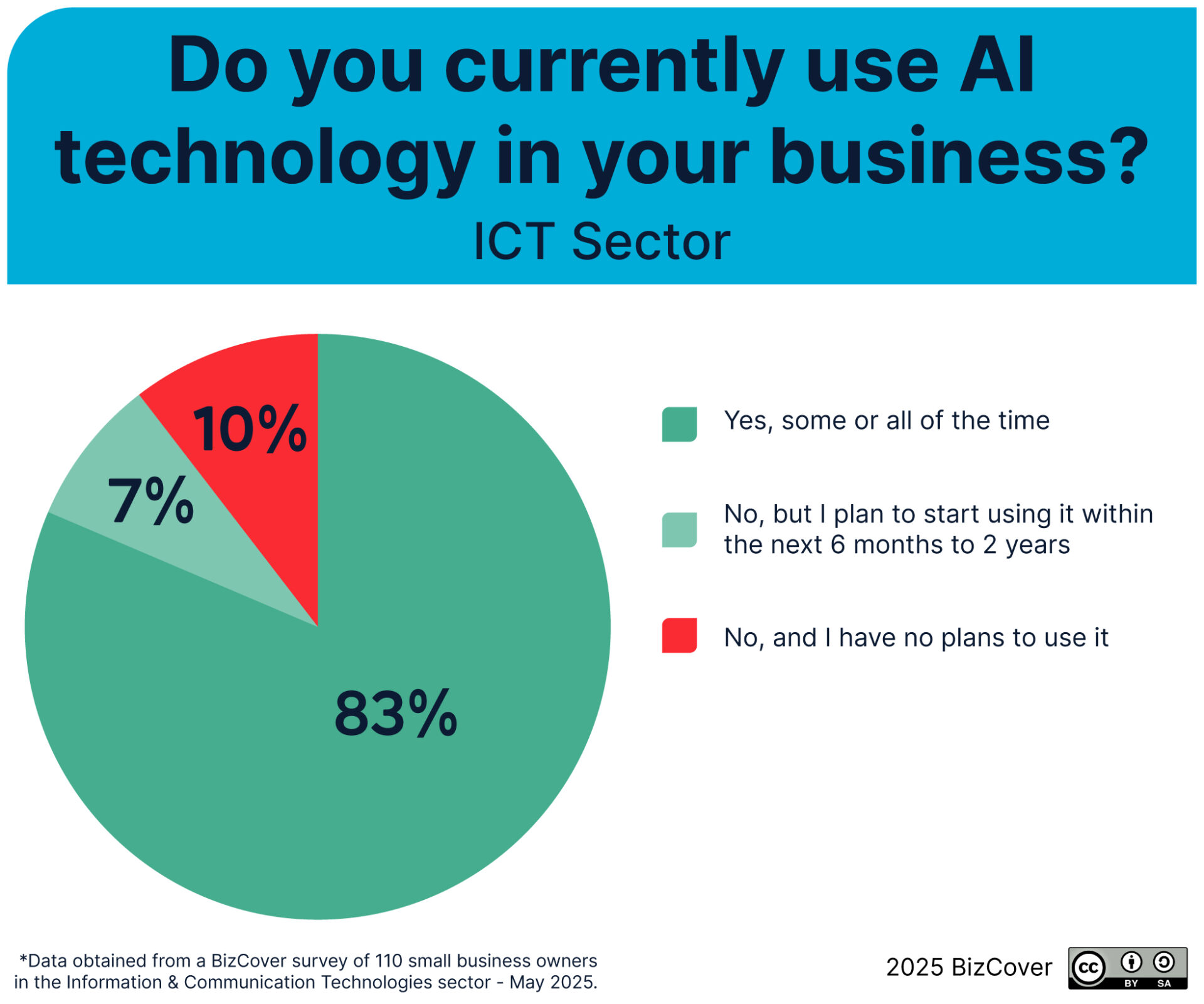
Barriers to AI adoption in ICT
While overall AI adoption within the ICT sector is high, not every business is rushing to integrate it. Though within the minority, the 10% of ICT respondents not currently using AI give the following reason for holding back:
- Waiting to see how AI develops before adopting it.
- Concerns about accuracy and reliability.
- Perception that AI is not relevant to current business needs.
Says Hoyle, “Even in a tech-forward sector like ICT, the decision to adopt AI is not just about innovation – it’s also about fit, timing and trust.”
These responses reflect a mix of cautious optimism and practical restraint. For some ICT professionals, the hesitation stems from a desire to better understand AI’s long-term capabilities and risks. For others, especially those that work in highly technical environments, accuracy and reliability are all-important.
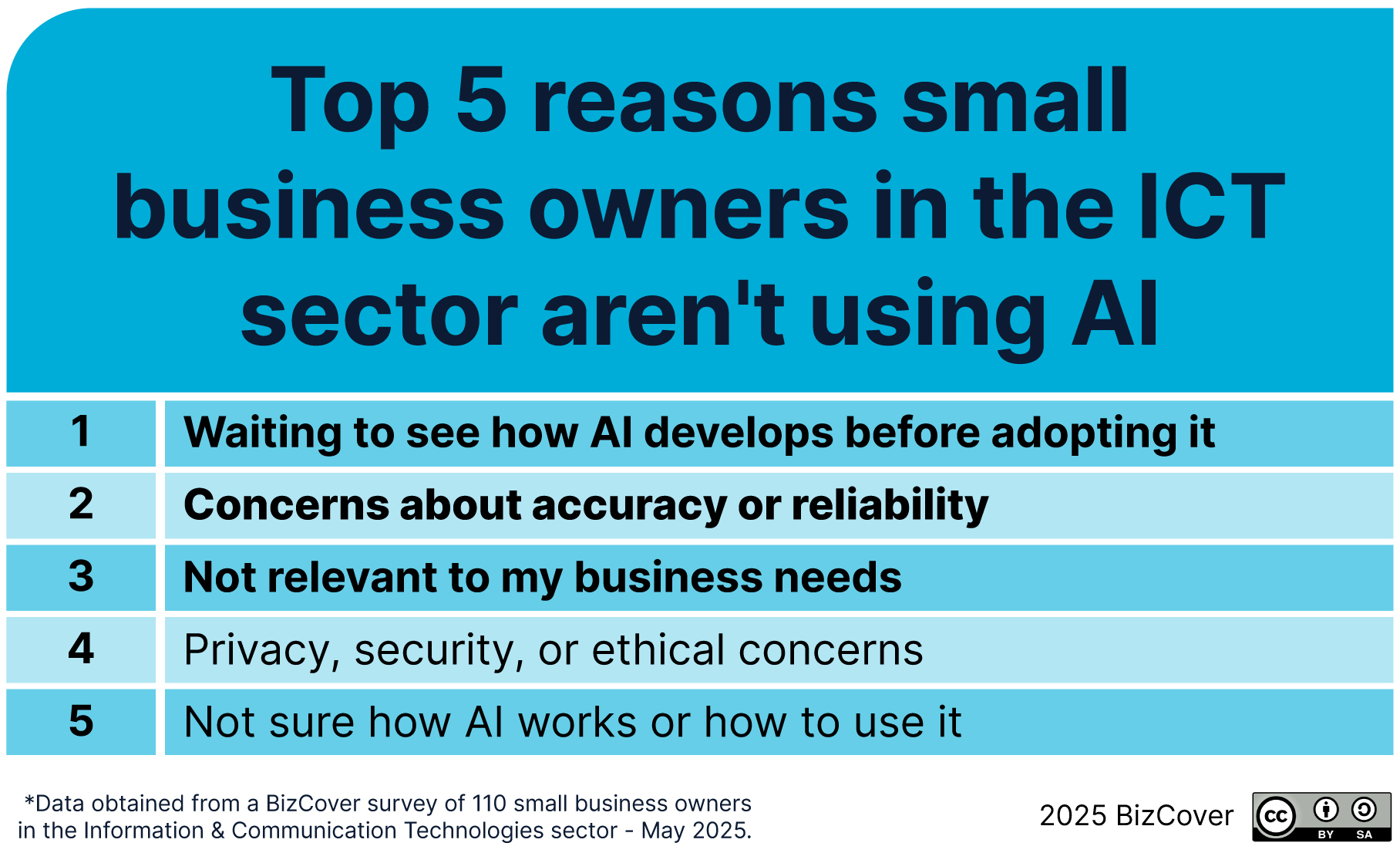
AI’s importance to daily operations in ICT
AI is playing a significant role in the day-to-day operations of ICT businesses, with nearly three-quarters (73%) saying it’s important to their work. This highlights how embedded AI has become in supporting everything from systems management to communications and development workflows.
However, 27% of ICT businesses still view AI as unimportant in their daily operations, including 13% who say it’s not at all important.
“These figures show a surprising split in AI adoption readiness,” comments Hoyle. “While a large percentage of ICT businesses are already integrating AI into core functions, others are either cautious, unconvinced of its current value, or simply in the very early stages of adoption.”
This diversity in adoption rates is not entirely surprising in a sector where efficiency, precision and scalability are often very high priorities – especially given that concerns about accuracy, reliability and usefulness are primary barriers for the ICT sector.
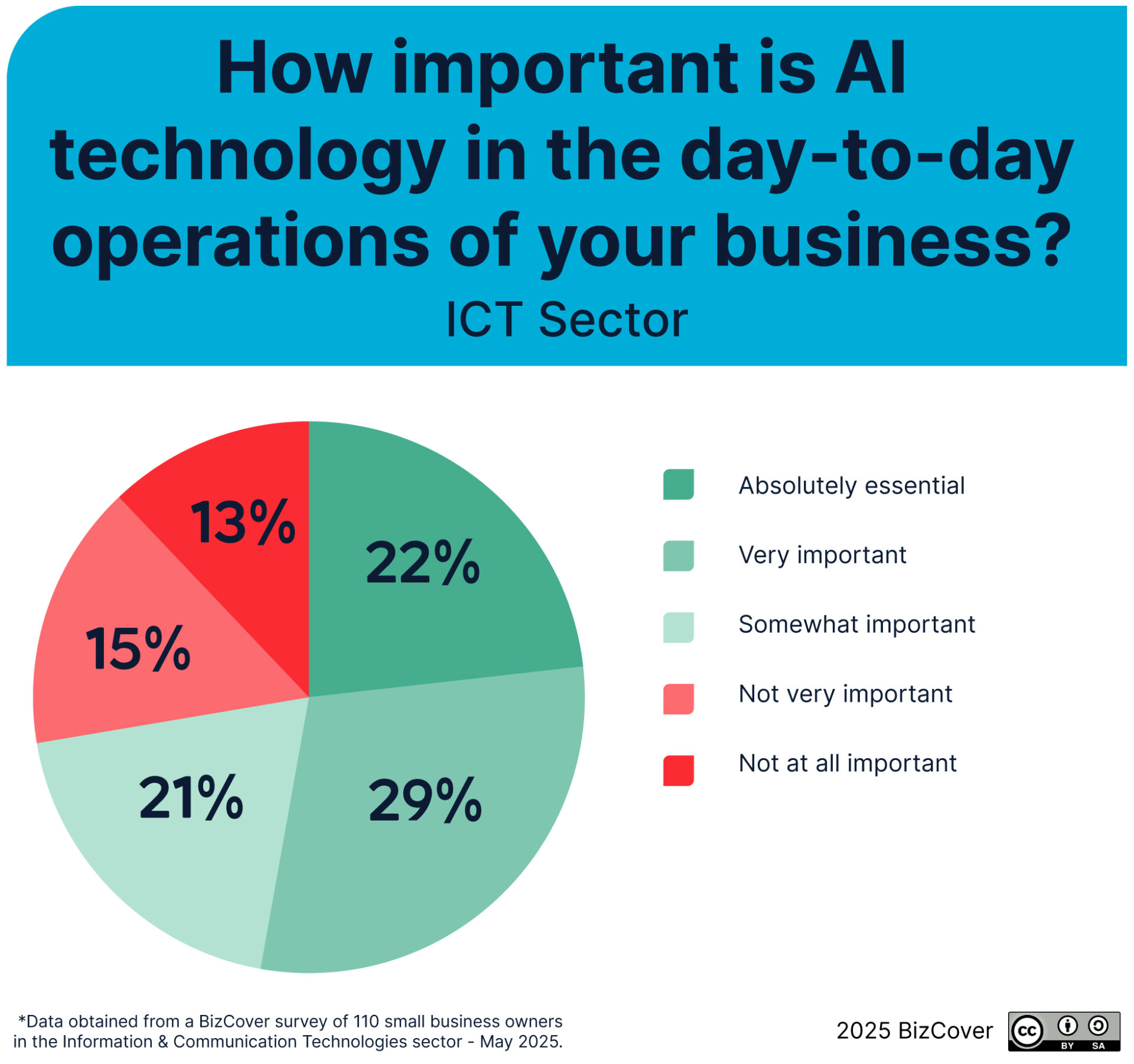
AI’s impact on skills in the ICT sector
When asked how AI will affect business skillsets over the next 3–5 years, 71% of ICT respondents said they expect it to create demand for entirely new skills. Only 3% believe there will be no change, signalling a broad consensus across the industry that upskilling is essential.
ICT businesses are already responding to this shift. Top areas of investment in skill development include:
- Technical skills such as coding and cybersecurity.
- AI, automation, and data analytics.
- Communication skills.
While the sector leans heavily into technical proficiency, concerns around soft skills are becoming more prominent:
- 54% believe AI will diminish human capability in content creation.
- 42% anticipate a decline in interpersonal and social skills (the second-highest concern across all surveyed industries).
- Only 26% think AI will improve human social skills.
The growing anxiety around soft skills highlights a growing tension between technological advancement and the human side of business. This is true for the information technology sector as well as other industries.
“ICT leaders know that technical skills are only part of the puzzle,” says Hoyle. “Soft skills like communication, creativity and emotional intelligence are also important considerations for businesses when navigating the future of AI.”
The sector also faces a serious talent challenge: 87% of ICT businesses report difficulties in finding professionals with the right mix of hard and soft skills. As AI adoption accelerates, this gap could widen if businesses don’t proactively address both ends of the skill spectrum.
Could AI replace roles in the ICT sector?
The ICT sector shows the strongest openness to AI replacing work across all industries surveyed. A full 75% of ICT professionals believe AI could replace some tasks or full job roles within their business, reflecting an extremely high level of comfort and confidence in automation. Only a small number (18%) believe AI could fully replace both tasks and roles.
When it comes to resourcing, 17% actively prefer using AI tools over hiring or outsourcing, and 36% say they would consider AI for specific situations. Combined, 53% are open to AI as a staffing alternative. On the other side, 46% remain unlikely – or totally unwilling – to replace human resources with AI.
It is not entirely surprising that the majority of people surveyed said they would look to AI as a staffing alternative, considering the difficulty in finding skilled workers. However, the fact that a large number of people would still prefer human talent indicates that there is a clear boundary between what AI can and cannot do. This suggests that most see AI as a support tool, not a complete substitute for human expertise.
“There’s excitement about what AI can automate, but also a clear recognition of where people are still essential,” Hoyle states.
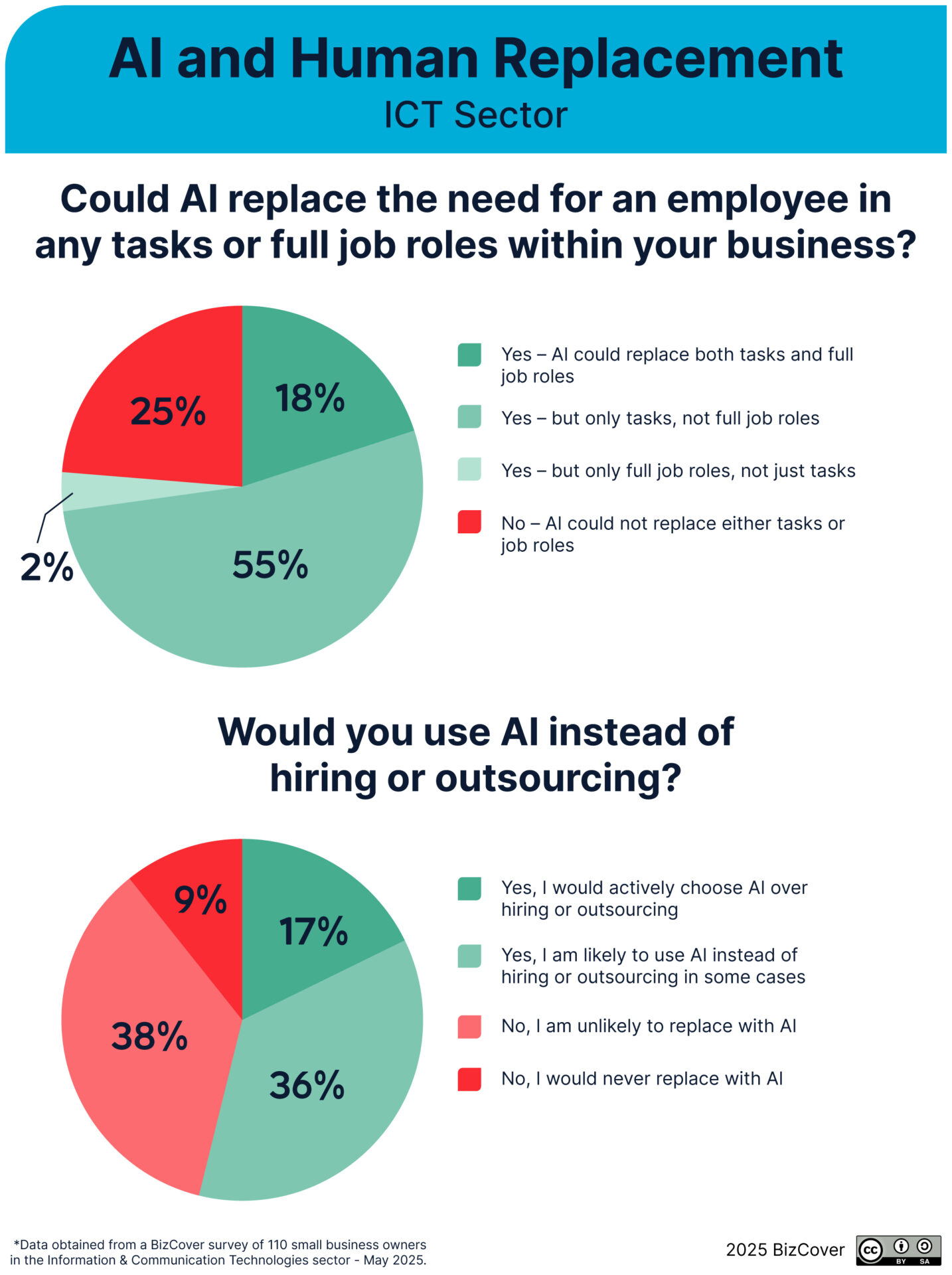
Roles that AI could potentially replace in ICT
So, if 53% of people are comfortable using AI as a staffing solution, what roles could potentially be impacted? According to the survey results, the top five jobs most likely to be impacted are:
- Technical writers
- Internal IT support/helpdesk technicians
- Customer support technicians
- Software developer
- Data analyst.
The top three roles suggest that AI could replace task-heavy, process-orientated functions. However, roles such as software developers and data analysts also appear on the list, indicating that even some highly skilled responsibilities may be impacted – particularly those that involve structured data tasks or code generation.
That said, the sector distinguishes between routine automation and advanced expertise. Highly specialised roles – especially those requiring creative problem-solving, architecture design, or client-facing strategy – remain less vulnerable to automation.
“ICT professionals see AI as a tool that enhances productivity by handling repetitive or clearly defined tasks,” says Hoyle, “while complex, strategic work remains firmly in human hands.”
Sentiment towards AI’s future impact in the ICT sector
ICT professionals are overwhelmingly optimistic about AI’s role in their careers and skill development:
- 75% feel positive about AI’s impact, seeing it as an opportunity to grow their skills.
- 17% remain neutral, expecting minimal change in their day‑to‑day work.
- Only 8% feel negative, split evenly between those somewhat worried about staying relevant (4%) and those who fear their skills may become obsolete (4%).
“The ICT sector’s optimism about AI highlights its readiness to embrace technological change and leverage AI to enhance both technical and soft skills,” says Hoyle.
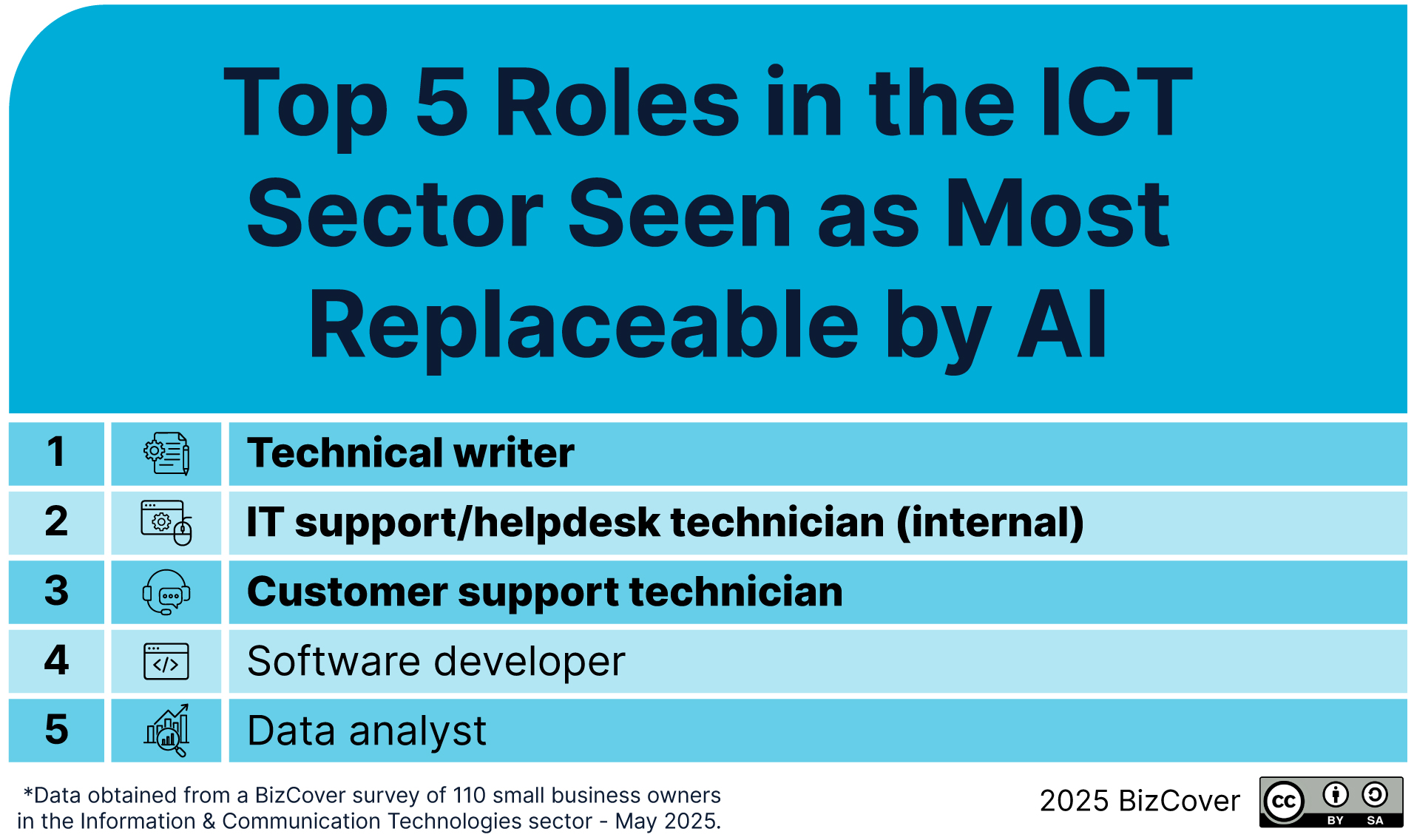
Conclusion: AI as an ally and catalyst for change
AI adoption among small ICT businesses in Australia is advanced and still accelerating. 83% are already using AI, and a total 90% either use or plan to implement AI within the next two years.
Despite significant challenges in hiring, ICT professionals are still determined to take a measured and practical approach towards automation. The sector is using AI primarily to automate routine, back‑office functions while preserving human expertise for complex work.
“This shows that AI is valued as a tool to enhance operational efficiency and sharpen decision‑making in areas such as technical support, data management, and content creation,” observes Hoyle. “The ICT sector recognises that human expertise is irreplaceable in roles requiring deep domain knowledge.”
Overall, small ICT businesses are highly optimistic about AI’s potential. They view it as a powerful ally for streamlining operations, driving innovation, and expanding human potential – but not as a substitute for the people who make technology meaningful.
Need help protecting your business in an age of AI? BizCover offers quick, online insurance quotes tailored to small ICT businesses. For on the go cover, go BizCover.
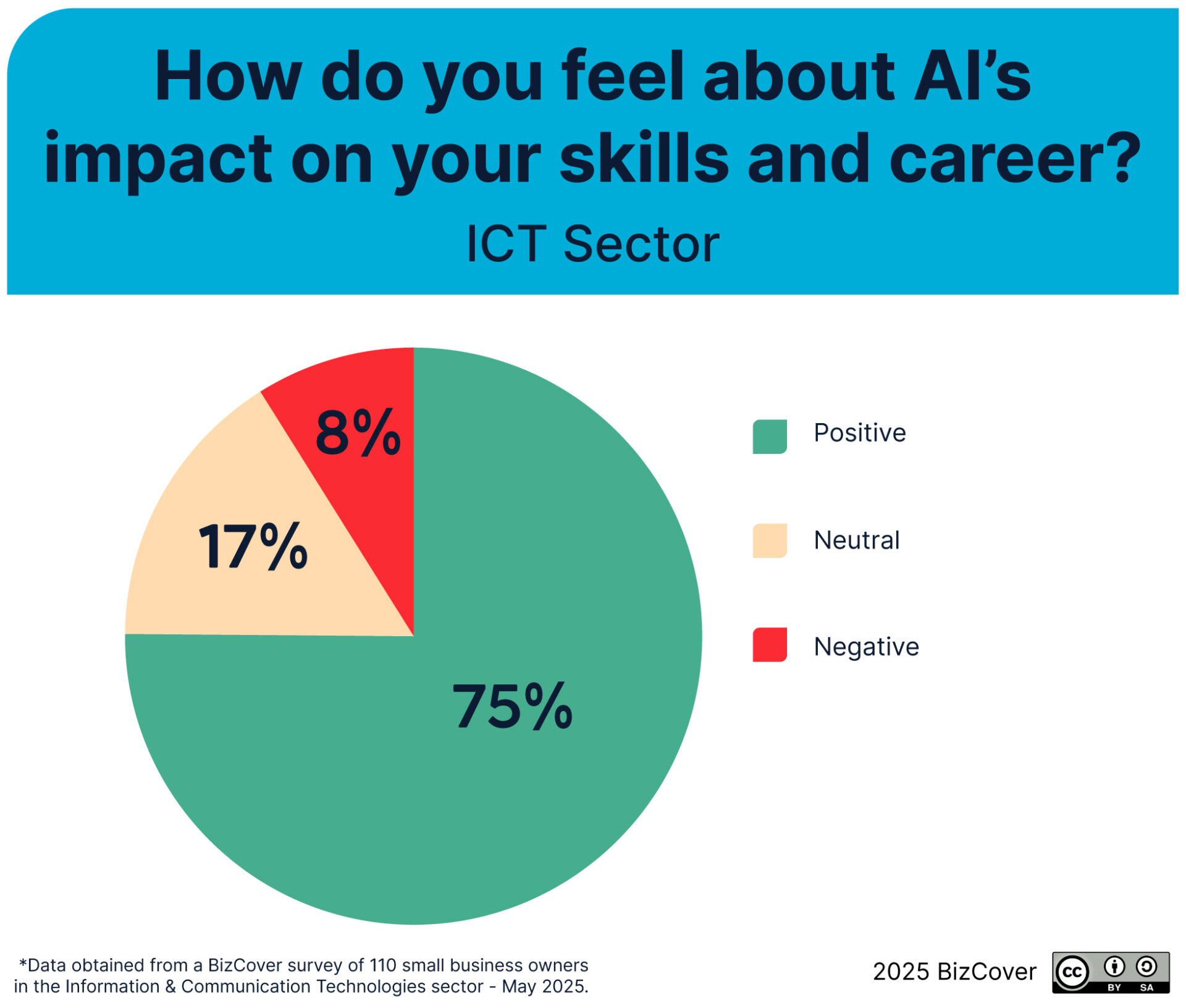
Methodology
This research was conducted via an online survey distributed to Australian business owners in April 2025. A total of 1,323 responses were collected. For the purposes of this analysis, only responses from small business owners (defined as those with 20 or fewer employees) were included, bringing the final sample size to 965.
These respondents represented seven industries, after excluding two industries with low response rates (fewer than 50 responses each) to ensure meaningful comparison. The remaining industries include Marketing and Communications, Consulting and Strategy, ICT, Healthcare and Medical, and others. There were 110 respondents from the ICT sector.
Respondents were asked a mix of multiple choice and checkbox questions covering AI adoption, its impact on operations and roles, and evolving skill requirements. The data has been analysed to highlight trends across small business owners, industries, and anticipated future use of AI in the small business sector.
© 2025 BizCover Pty Limited, all rights reserved. ABN 68 127 707 975; AFSL 501769
This information is general only and does not take into account your objectives, financial situation or needs. It should not be relied upon as advice. As with any insurance, cover will be subject to the terms, conditions and exclusions contained in the policy wording or Product Disclosure Statement (available on our website). Please consider whether the advice is suitable for you before proceeding with any purchase. Target Market Determination document is also available (as applicable). © 2026 BizCover Pty Limited, all rights reserved. ABN 68 127 707 975; AFSL 501769.



